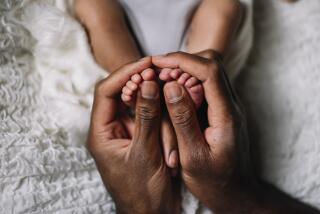Families Strive for Interfaith Balance : Children: Grandparents are learning how to pass on their own traditions while respecting the sensibilities of their children who married into different religions.
- Share via
NEW YORK — Jean Levin says she feels a moment of sadness whenever the ceremony of the naming of a child is held in her temple.
Two of her grandchildren are being raised as Unitarians, so she knows she must pass on her tradition in ways other than the formal rituals that have been passed down for generations.
They get together as an extended family on all the religious holidays. At every Jewish holiday, her 6-year-old granddaughter knows all the stories that give it meaning, she said. And the young girl in turn knows “Nana” will be there to share Christmas with her.
“When our granddaughter is involved in a Christmas pageant, or anything else that is important to her, we are always there for her,” Levin said.
The Levins are among a new generation of interfaith grandparents who are learning how to strike a balance between passing on the traditions that are important to them and respecting the wishes of their children and sons- and daughters-in-law of different faiths.
The old joke that a “mixed marriage” was one between an Italian Catholic and an Irish Catholic is outdated. As ethnic and religious identities have broken down in the last generation, marriages between people of different faiths have become more common. There are more than 500,000 Jewish-Christian couples in the United States, and an estimated 2 million children born of these marriages, according to B’nai B’rith Women.
As the Baby Boom generation moves society forward with each trend that affects it, new attention is being paid to the joys and sorrows of interfaith grandparenting as couples in interfaith marriages have children of their own.
Grandparenting experts say to forget about the image etched in popular culture of Archie Bunker secretly carrying his grandson into a church to perform an unofficial baptism.
The No. 1 rule of interfaith grandparenting: Follow the parents’ wishes.
“The first thing that the grandparents have to understand is that the parents have the prime say,” said Dr. Glenn Austin, author of “Grandparenting for the ‘90s--Parenting Is Forever.”
Grandparents who are unaccepting of the parents’ decision on the religious upbringing of their children, such as the mother who waved a baptismal gown in protest of her grandchild being raised Jewish, may find themselves shut out, said Sunie Levin, Jean’s sister-in-law and the author of “Mingled Roots: A Guide for Jewish Grandparents of Interfaith Grandchildren.”
“It’s a good idea . . . with some parents to work out an outline of what you’re going to do,” Sunie Levin said. “It has to be without a hidden agenda.”
But grandparents also have a responsibility to share the religious tradition that is important to them.
“They need to be very straightforward about it. They should not be embarrassed or reluctant about it,” said the Rev. John Pollard of the education department of the National Conference of Catholic Bishops. “That’s an important part of the grandparent.”
Jay Rock of the Office of Jewish-Christian Relations of the National Council of Churches said he thinks it would be “a great gift” for grandparents to share that part of their lives with their grandchildren.
“One of the most troubling things for children is to have their family create blanks for them . . . especially from this kind of stuff, which is not harmful to them,” he said.
Ideas offered by Levin in her book for Jewish grandparents include talking with the grandchildren about themselves and their parents and grandparents, explaining Jewish objects and pictures in their homes and visiting a Jewish museum and a synagogue.
When Hanukkah rolls around, Levin recommends inviting the grandchildren, their parents and the non-Jewish grandparents over for a party during which the Hanukkah story can be told, perhaps with stick puppets that the children have made.
But she adds that Jewish grandparents also should make a special effort to attend if they are invited to a Christmas dinner.
“Keep in mind that yours is not the only cultural heritage being passed down to your grandchildren,” writes Levin, who also is planning an ecumenical book on interfaith grandparenting.
Grandparents need not worry too much about not offering their religious tradition to their grandchildren.
Even if they tried, Pollard said, the grandparents could not keep their faith hidden in a close relationship.
More to Read
Sign up for Essential California
The most important California stories and recommendations in your inbox every morning.
You may occasionally receive promotional content from the Los Angeles Times.










